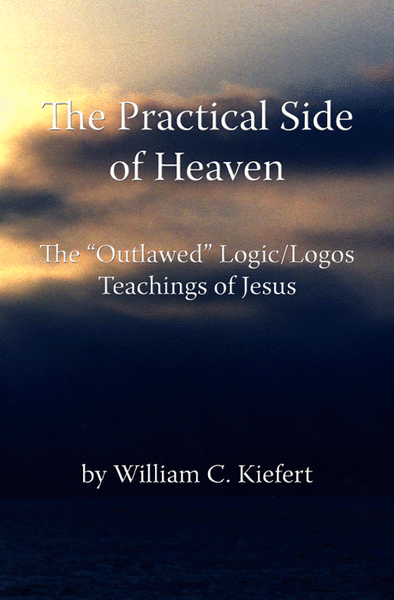
Learn more about The Practical Side of Heaven
Copyright William C. Kiefert. All Rights Reserved.
Chapter Two, Part Two: What is Logic and How Does It Affect Us?
Our logical laws lead us to think that one alternative must be superior to all others: let us call this hierarchical thinking. Logic leads us to conclude that if one alternative is right, then all the others must be wrong: let us refer to this as drawing either/or conclusions. Finally, our logic directs us to conclude that one alternative must be the best, indeed, for everyone: let’s call this judgmental reasoning or hard logic. Hierarchical, judgmental, either/or conclusions are incompatible with nonjudgmental values of acceptance, tolerance, non-discrimination, and love.
An additional system of logical laws could enable us to reason in a complementary way and so arrive at non-judgmental conclusions which would support those values which are required for any ethical social order. Judgmental thinking has been recognized by other authors as a source of the social problems, and some thinkers have gone so far as to lay the blame specifically on our present laws of logic. What is original about this book is that it explains how our laws of logic came to be hierarchical, either/or, and judgmental. But Gnostic Christians go even further. They propose an additional system of logic which will be the basis for reasoning that is harmonious with our spiritual nature. Simply said, our system of logically laws is unfinished. Our present system is appropriate to use in scientific, but not in social dimensions of life. Gnostic Christians propose an additional system of nonjudgmental laws of logic that better represent our social values.
Note: Gnostic Christianity does not deny the usefulness of our present system of logical laws in the areas of science: it promotes the development of an additional system that would be appropriate to use in our social affairs.
The culprit, then, is that our present process of reasoning predisposes us to think that it is reasonable, and therefore, acceptable to ignore the needs of other people. Don’t we have enough to do just to take care of our own needs? Isn’t dealing with our own problems sufficiently burdensome? It’s reasonable to pay attention to ourselves first. It seems logical to care about our families more than our neighbors and certainly more than strangers. How do we arrive at these conclusions? They are the result of reasoning in terms of either/or and us-versus-them: either we help ourselves and our family, or we help others; either we look out for ourselves, or no one else will; either you are with us, or you’re against us; either you believe what we believe, or you’re wrong. Such thinking divides the world into two opposing camps: Capitalist vs. Communist, Democrat vs. Republican, Catholic vs. Protestant, Jew vs. Gentile, black vs. people of a lighter color skin, heterosexuals vs. homosexuals. Whether the categories be religious, economic, political, racial, sexual, or gender-related, when we think in terms of us-versus-them, we turn those who disagree with us into opponents, or even enemies. Cooperation seems to be capitulation; compromise appears to be selling out; and “all-or-nothing” and “winner-take-all” attitudes dominate the battlefield. The result can be prejudice and intolerance; and it does not take long for these to escalate into hatred, contempt, even violence, and eventually war. And all because of the way we process ideas or reason!
Thus, regardless of what our religions teach us about loving our neighbors and even our enemies, and no matter what our hearts may feel, to our minds it is logical, reasonable, sensible, and certainly practical to do quite the opposite. If there is a problem in doing what we feel deep inside is right, it is because we are unable to reconcile our feelings with our reason, our hearts with our heads! The great Protestant theologian Paul Tillich called for an “encompassing” reasoning to supplement our “technical” reasoning. We need to reason in such a way as to encompass conflicting alternatives in situations of human disagreement. Ordinarily, our thinking leads us to reject any opposing view. Quite simply, we’re right, and if anyone disagrees with us, then they’re wrong. But where human beings are involved, we need to do better than this. We must not alienate or reject others just because they are different or hold different views. Human relationships call for reconciliation, which will allow us to include rather than to exclude. In short, we need a logic for our hearts. We need nonjudgmental logic.
